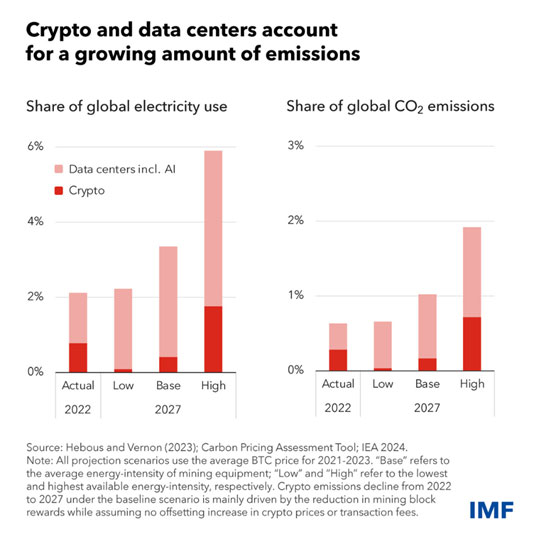
WASHINGTON DC, Sep 24 (IPS) – What do crypto assets and artificial intelligence have in common? They’re both power-hungry.
Because the powerful equipment that “mines” cryptocurrencies consumes a lot of electricity, a single Bitcoin transaction requires about as much electricity as the average person in Ghana or Pakistan uses in three years. ChatGPT Searches require 10 times more electricity than a Google search, due to the electricity consumption of AI data centers.
As the Chart of the week shows, crypto mining and data centers together accounted for 2 percent of global electricity demand in 2022. And that share is expected to rise to 3.5 percent in three years, according to our estimates based on projections from the International Energy AgencyThat would be equivalent to the current consumption of Japan, the world’s fifth-largest electricity user.

The climate impact of these activities, regardless of their social and economic benefits, is a cause for concern. A recent IMF working study paper found that crypto mining could generate 0.7 percent of global carbon emissions by 2027. If we extend the analysis to data centers (based on IEA estimates), this means that their carbon emissions could reach 450 million tons by 2027, or 1.2 percent of the global total.
The tax system is a way to steer companies toward reducing emissions. According to IMF estimates, a direct tax of $0.047 per kilowatt hour would encourage the crypto mining industry to reduce its emissions in line with global goals.
If we also consider the impact of air pollution on local health, that tax rate would rise to $0.089, which equates to an 85 percent increase in the average electricity price for miners. Such a levy would increase annual government revenues worldwide by $5.2 billion and reduce annual emissions by 100 million tons (about the current emissions of Belgium).
For data centers, a targeted tax on their electricity consumption would be set at $0.032 per kilowatt-hour, or $0.052 including air pollution costs. It’s slightly lower than for crypto, as data centers tend to be in locations with greener electricity. This could bring in as much as $18 billion annually.
The situation today is the other way around: many data centers and crypto miners enjoy generous tax exemptions and incentives on income, consumption, and property. Given the environmental damage, the lack of significant employment, and the strain on the electricity grid (potentially rising household prices and reduced demand for the use of other low-emission goods such as electric vehicles), the net benefits of these special tax regimes are unclear at best.
Policy incentives
On the other hand, AI applications can lead to smarter and more efficient energy consumption, which some have already done. posited could help alleviate the demand for electricity. The right policies can still stimulate the development of AI applications with positive societal spillovers, while addressing environmental damage.
For policymakers, a broad carbon price coordinated across countries would be the best way to curb emissions, as it would encourage reduced fossil fuel use, cleaner energy sources, and improved energy efficiency. To limit global warming to 2 degrees, countries would need to implement additional measures equivalent to a carbon price rising to $85 per ton in 2030.
In the absence of a global carbon price, targeted measures could encourage crypto miners and data centers to use more energy-efficient equipment and even motivate the adoption of less energy-intensive crypto mining. Supplementing electricity taxes with zero-emission credits, bilateral electricity purchase agreements, and possibly renewable energy certificates would also help.
Cross-border coordination also remains important, as stricter measures in one location could lead to relocation to jurisdictions with lower standards.
With the window of opportunity to curb rising temperatures closing rapidly, expanding renewables and introducing an appropriate carbon price are urgently needed. In the meantime, targeted measures, including taxes, can help limit rising emissions from crypto mining and data centers.
Source: International Monetary Fund (IMF)
IPS UN Office
Follow @IPSNewsUNBureau
Follow IPS News UN Bureau on Instagram
© Inter Press Service (2024) — All rights reservedOriginal source: Inter Press Service







